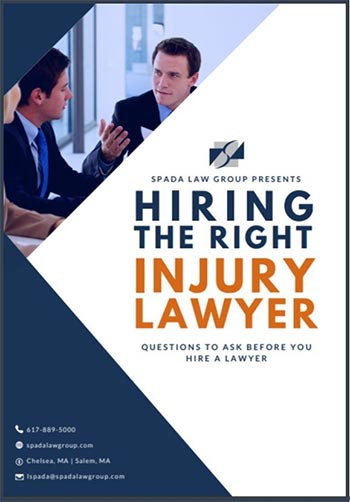The Origins of an East Boston Attorney ![East Boston Car Accident Attorney]()
As a kid growing up in East Boston, I lived on a street at the entrance to the Sumner Tunnel. I was so close to traffic entering the tunnel that friends would call me before they drove near my house for traffic updates. Fast forward 40 years and I am still dealing with the consequences of East Boston traffic. Since 1998 my firm has successfully handled thousands of car accident cases in the Boston area and each of these cases got resolved in one of only four ways: Settlement, Mediation, Arbitration or Trial (SMAT). In the last 6 months alone, I along with my colleagues here at Spada Law Group have utilized all 4 methods to resolve car accident cases for our clients. In this blog I briefly summarize each method along with its pros and cons.
Settlement
Approximately 85-90% of the Boston car accident injury cases that we handle get settled directly with the insurance company without any involvement from judges, mediators, arbitrators or defense attorneys. When an injured client comes to us we handle ALL the administrative paperwork that a typical car accident case entails. We will also hire investigators, accident reconstruction experts and appropriate medical experts if necessary to ensure we can support our client’s position on who was at fault and the nature and extent of their injuries and damages. Once our clients are at a medical endpoint, meaning they either recovered fully or they are at a point where they will recover no further, we begin to negotiate with the insurance company to get our client’s case settled for a fair and reasonable amount.
Pros
I have yet to meet a client who would rather go to court than promptly settle their case and get on with their lives. Therefore, the main benefits to settlement is certainty, speed and fewer disruptions to their life. It is also less expensive to the client since court filing fees, experts fees and deposition expenses are avoided.
Cons
Sometimes an insurance company will sense that a client (and sometimes a lawyer) is reluctant or fearful to go to court and will use this leverage to offer a client a lower amount to settle. Insurance companies prey on such fear or reluctance and often use it to their advantage. Therefore, it is important that you hire a lawyer who has experience going to court since the best way to increase your chances of a fair settlement is to prepare the case from day one as if it is going to go to trial and have a lawyer willing and able to try the case if necessary.
Mediation
Mediation is a voluntary process during which the parties attempt to settle their case outside of the court system by using a mediator to assist them in the negotiation process. The mediator is usually a retired judge or an experienced attorney whose role it is to help each side (both of whom may be dug in on their positions) compromise and get closer to an agreeable resolution. Mediation is voluntary and not binding on the parties. If the case doesn’t settle, the parties are free to continue to try the case in court or to settle the case on their own at a later time.
Pros
Mediations is voluntary and relatively inexpensive compared to litigation. I always tell my clients that there is very little to lose by going to mediation if the other side will agree.
Cons
There is a fee for mediation and depending on the size of the client's case the fee may be material. Mediators typically charge between $500 and $750 per party for a three-hour mediation.
Arbitration
I describe arbitration as a “mini trial without all the rules”. Arbitration in most cases is also a voluntary process, and both parties must agree to participate. If they do, an arbitrator is selected, and that arbitrator will act as the judge, hear evidence and decide the case. The arbitrator is almost always a retired judge or a very experienced personal injury lawyer. The rules of evidence are usually very relaxed and therefore getting evidence to the arbitrator for their review is less cumbersome than it would be getting it to a jury for review at a trial. Once the arbitrator hears all the evidence, and reviews any documents submitted he or she will issue their decision. The arbitrator's decision is final.
Pros
Arbitration is quicker and cheaper than trying the case in court. Our court system in Massachusetts is slow and it can sometimes take years to get an ultimate trial date. Also, arbitration is significantly less expensive than presenting your case in court. Arbitrators charge for their time and the cost for a one-day arbitration ranges between $750 and $1500.
Cons
The most significant disadvantage of an arbitration is you put the fate of your case in the hands of one person instead of the collective wisdom of a jury. In certain cases, this perceived disadvantage I consider an advantage depending on the nature of the evidence I intend to offer. The real disadvantage I believe is that there is no right to appeal an arbitrator's decision if you think a mistake was made. The decision is final.
Trial
Trial by jury is a fundamental right we enjoy in our great country and this right is embedded in both the United States Constitution and our own Massachusetts Constitution. In a Boston car accident case you are entitled to a jury trial to resolve the matter. To do so you, now referred to as the plaintiff, must first file a complaint in court, either the District Court or Superior Court depending on the severity of your injuries. After the complaint is filed, a copy of it is sent to the at fault driver, now referred to as the defendant, who then must file his or her answer to the complaint with the court. Once the answer is filed the discovery phase of the case begins. During the discovery phase (which usually lasts approximately 6 to 8 months) the parties will attempt to learn as much as possible about the other party’s evidence. Each side typically submits written questions (called interrogatories) for the other party to answer. Also, each side gets an opportunity to ask questions in person of each other and any witnesses. These in person question and answer sessions are called depositions. Once written questions are answered and depositions have been taken the case will be scheduled for a trial. At trial each side will present their evidence to a jury who will ultimately determine who was at fault for the accident. If they find for the injured person, they will decide how much to award that person in damages. Obviously, I have overly simplified the description of the jury trial process due to space considerations. For a detailed description of the entire litigation process download a free copy of my recent book, “What You Need To Know About Your Massachusetts Car Accident Case”. In it I answer the most frequently asked questions about handling a Boston car accident case and I talk about the litigation process in great detail.
Pros
I would say that there are very few cases in which going to trial on a car accident case is the best method of getting the matter resolved. However, in some hotly contested, large injury cases, it is the only way to fully present your clients case and to give your client the best chance of getting a fair monetary award. At trial you will have a chance to present the fullest version of your client’s case through witness testimony, documents and expert witnesses.
Cons
Getting a trial date and getting your case heard can take years. I find one of the biggest impediments to getting a case tried in court is simply the amount of time an injured person is required to wait before getting their day in court. Also, taking depositions and hiring expert witnesses is a very expensive proposition. We tried a case in September 2019 where we spent tens of thousands of dollars trying the case. Our neurosurgeon expert’s fee for trial testimony alone was $1,000 per hour! Although we advance all expenses for our clients, ultimately those expenses get paid back to us if the jury rules in our client’s favor. Therefore, a trial by jury often doesn’t make financial sense on smaller cases.
Have You Been Injured in a Boston Car Accident?
The best thing you can do if you have been injured in a Boston car accident and want to be fairly compensated is to understand your legal rights before you make any decisions. Before you speak to an insurance company adjuster, sign or submit any paperwork or hire a lawyer, you owe it to yourself to get as much information as you can, so you can make a smart decision on what you need to do next. At Spada Law Group, we offer free consumer guides and videos that answer many of the questions car accident victims have. Take a look, download our free information or contact us for a free consultation. Learn what Spada Law Group is all about and how we might be the right personal injury lawyers for you.




